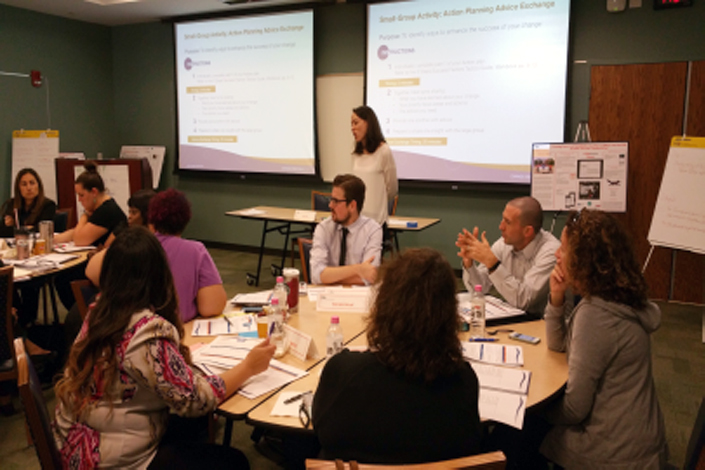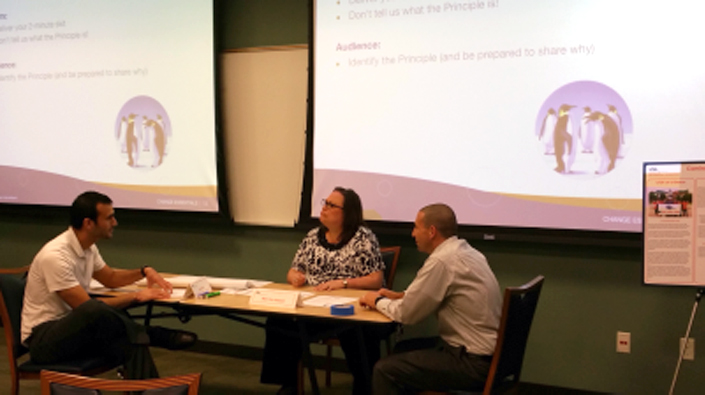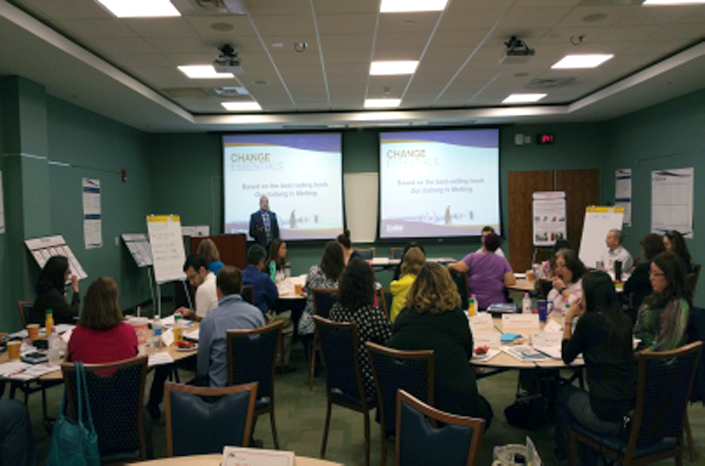
As part of its Integrated Planning and Advising in Student Success (iPASS) initiative, the Bill & Melinda Gates Foundation recently hosted a Kotter International Change Management training session at the University of Texas at San Antonio (UTSA). UTSA was one of 26 institutions selected nationwide to design and implement projects that enhance support and services impacting student success and degree completion.
Faculty, staff and advisors from UTSA as well as the university’s iPASS core team members from the Office of Information Technology (OIT) participated in the informative all-day session, which focused on the Kotter 8-Step Process for Leading Change.
The training served as a springboard to help members of the UTSA community and our institution’s iPASS core team to identify areas for continued improvement in both our project implementation and adoption efforts. Recording attendee feedback was a big priority for us. Therefore, core members of the iPASS Committee, including Assistant Vice Provost for IT and iPASS Principal Investigator Dr. Vanessa Kenon, Executive Director of Advising Services Barbara Smith and Communications Specialist Dr. Delia Swiger kept track of the many ideas and comments that our participants were expressing. In the process, we realized that our experience and takeaways might also be relevant for other institutions.
Defining Roles and Securing Stakeholder Buy-In
The highly interactive session featured real-life situations and discussions. These were mainly centered on our implementation of the Education Advisory Board’s (EAB) Student Success Collaborative (SSC), an initiative set for rollout fall 2016 at UTSA. As it pertained to the EAB SSC, we were able to very clearly outline advisors’ role in student success. The training also helped staff and faculty members to understand exactly how these tools will enhance their own roles within the context of student success.
The result? Each group now has a much better grasp of just how important they are to generating insightful data that will provide a holistic view of each student. Although technological tools and administrative processes are only a part of the entire student success picture, their buy-in from members of the university as a whole is absolutely imperative in order for the project to be successful.

Transformative Training on Change Management
During the training, facilitators Dr. Mei-Yen Ireland, Associate Director of Data, Technology and Analytics, and Data Coach Leon Hill of Achieving the Dream showed how the iPASS project’s implementation and some of the concerns surrounding it actually relate to the 8 step process.
All of the steps in the training helped to generate new ideas to strengthen the project. In particular, the team focused on the 4th step, “Communicate for Buy-In,” as successful implementation would require that everyone involved be on board or "buy-in." (There were, undoubtedly, other steps which related as well.)
Hearing the statistic that 70% of organizations fail to change was staggering. Based on this, we must continue to investigate the challenges that prevent or delay change as they relate to our institution, such as fear of the unknown and the inability to get people to buy-in.
Following the Kotter training, we distributed a survey to collect participant reactions. It was both rewarding and encouraging to see that all attendees found the training to be either useful or very useful, and believed they had a role in change when implementing the EAB/SSC tool. In addition, the majority of attendees stated that they now felt better able to create change in their work area, given the extremely informative training they acquired.
Capturing advisors’ interest in how the work we’re doing for iPASS is woven into their own roles is critical to creating a culture of early adoption and enthusiasm.

Taking Action to Include Faculty
Commentary received from training attendees was insightful, and much of it confirmed the perspectives of the iPASS committee. One of the key takeaways was that advisors want to be actively involved to support our efforts, specifically with regard to communication about any training, outreach, and technology rollout related to the grant.
We have put this suggestion into action by adding several new faculty and staff members to the iPASS committee. In addition, we will open up critical feedback loops with a representative group of our stakeholders through the OIT Faculty Advisory committee. While the OIT Faculty Advisory committee provides recommendations on technology, we plan to include regular input as it pertains to the iPASS project. To that end, we plan for them to meet several times each academic year in order to learn about and discuss upcoming changes.
Hosting this training session has been the perfect opportunity for the iPASS core team to gather candid thoughts from faculty about their role in student success. We’re energized and are now much better prepared to create, lead and manage sustainable change at UTSA.
Rosalind Ong De Trevino serves as a project coordinator in the Office of Information Technology at the University of Texas at San Antonio.
Nicole Duff serves as a communications specialist in the Office of Information Technology at the University of Texas at San Antonio.
